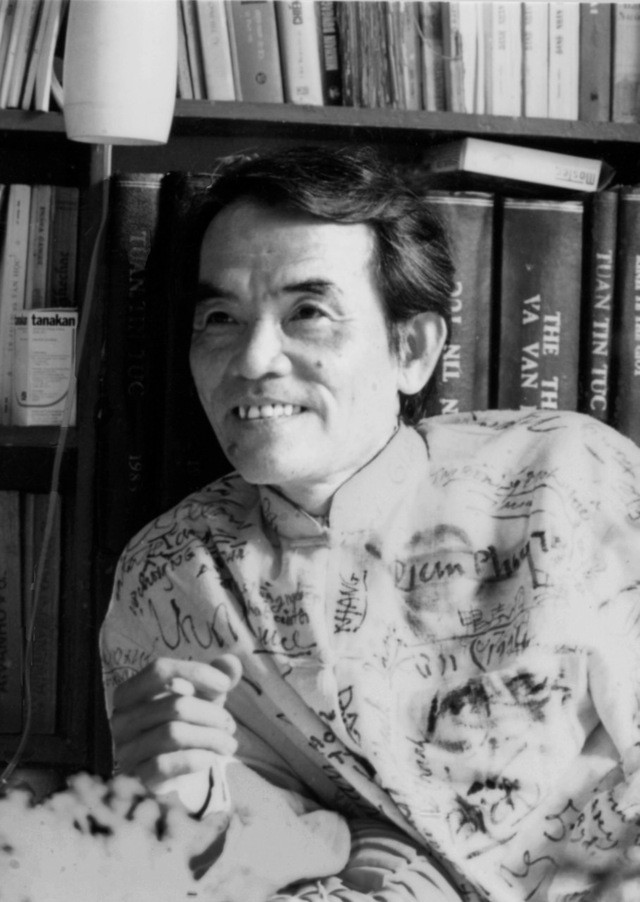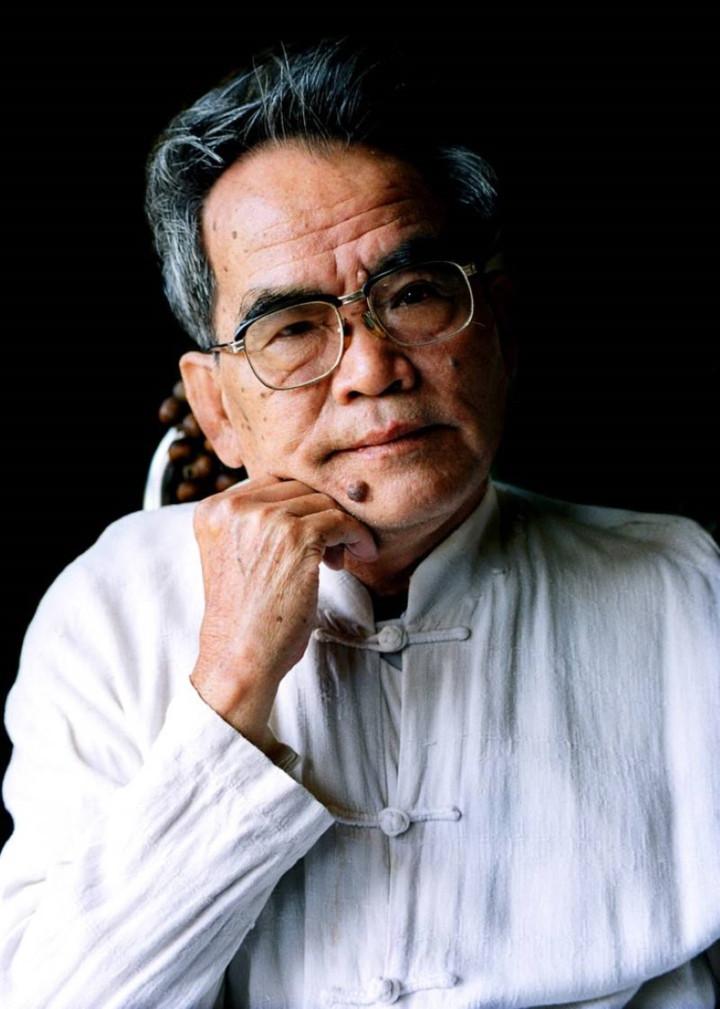Hoang Phu Ngoc Tuong: Knowing we're breaking up, I still feel sad.
(Baonghean.vn) - I keep telling myself not to be sad, because sooner or later everyone has to leave this world. For me, it's a peaceful walk, free from decades of pain, but why am I still sad, so sad that my heart is burning, Tuong!
Nearly twenty days ago (July 7, 2023), I, along with writers and poets Vo Que, Mai Van Hoan, Meggie Pham, and Le Vu Truong Giang, on behalf of the Vietnam Writers Association in Hue, went to Ho Chi Minh City to attend the funeral and send off poet Lam Thi My Da to her final resting place. That day, I saw that Hoang Phu Ngoc Tuong's health was almost exhausted, like a lamp that had run out of oil. Da Thi said: "My father is very weak! I thought my father would go first, but I didn't expect it to be my mother..."
So, his departure today was foretold, not only a few dozen days ago, but also 25 years ago, when he suddenly suffered a stroke in 1998. Human destiny is strange, everyone has to say goodbye to this world at some point, but every farewell is sad, even if it was clearly foretold very early, like in his case.

In modern literature, Hoang Phu Ngoc Tuong is not the first in quantity, but is the first in quality. He only had time to attach his name to twenty works, but he is the most talented essayist, next to Nguyen Tuan. His last book is a selection of the best essays, taking the title of his third book,Who named the river?(2010), in the dedication of the book to me (October 17, 2010), he wrote in trembling handwriting that "a dedication to Hue". The space of mountains and rivers, flowers, leaves, sunshine and rain that make up the main theme of this book is Hue, Hue culture - a seamless culture that flows throughout from the past tradition of the "fourth fence" (Nguyen Trai) to the red blood and fire of war and the joys of victory, with worries in the years of peace.
As a writer, he is not the only one, but certainly the number one, the one who writes the most and best about the climate, land, mountains, rivers, nature and people of Hue. It seems that the words he writes are always condensed to the point of being filled with the essence of Hue, he delves deeply into the Perfume River and Ngu Mountain (Lots of Fire, Who Named the River, Sad Epic, Fragrant Grass, Flowers and Fruits Around Me, Tuyet Tinh Coc, The House of the Wanderers), sometimes his pen reaches far to Con Son, to Quang Tri, his old hometown (Green Childhood, Corridor of People and Wind), up to the top of Bach Ma (The Mirage Mountain), or the hardships, joys and sorrows in the memories of a time in the mountains and forests of the war zone (My "Old Beauty", Dragonfly Ly, Forest Life, Laughing Forest), but are all associated with space, trees and the consciousness of the people of Hue.
The writer not only demonstrates a thorough understanding of a huge reserve of cultural knowledge and human life, not only enlightenment but also humanistic enlightenment, with the ability to build symbols, mythologize plants and flowers, giving them eternal spiritual life with humanity.

Hoang Phu’s literary “genus” belongs to the heart, to the pain of the world, the immense sadness and the long dream that passes through many lives. He talks about joy, but joy is very short-lived, only stopping in the idea, or suddenly flashing like a joy and then quickly fading away in the eternal night.
Rarely is there a generation / friendship as deep as the talents who were close friends, often visiting the house of the vagabonds: Hoang Phu Ngoc Tuong, Trinh Cong Son, Ngo Kha, Dinh Cuong, Buu Y, especially the relationship between Hoang Phu and Trinh. In addition to the memoirsLike a river from its source to the sea, he wrote in the war zone in 1971, there were 10 other memoirs written after Trinh passed away (2001), which also means when he fell ill due to a stroke (1998), had to lie down and dictate for his family to record and had them printed into a collection.Trinh Cong Son - The Little Prince's Lyre(2005).
With his deep understanding of the heart and soul and his literary talent, Hoang Phu analyzed the formation of Trinh's ideology, artistic conception, his path to the student movement and Trinh's stopping point was just here. Stopping here, so that Trinh Cong Son could reach a higher peak as a musician of love, of human destiny and peace for humanity. Not only stopping at Trinh Cong Son, but through Trinh, the author also sketched the portrait of an entire generation of intellectuals in the South: Ngo Kha, Tran Quang Long, Le Minh Truong, Dinh Cuong, Buu Y... Each person had a different commitment, a different turn in life, but they were all patriotic intellectuals.
Even for Hoang Phu himself, in the summer of 1966, Hoang Phu was the trigger, the leading voice in the struggle movement of intellectuals, students, and pupils in the South. If the Saigon regime at that time had not declared him "outlawed" (if caught, he would be killed without trial), he would not have gone to the forest to fight. Staying in the inner city, he was also a patriotic intellectual like his friends of the same generation.

Over the past decades, there have been countless theses, master's theses and even doctoral dissertations researching him, countless works and articles by professional writers and critics who sympathize with him (and, I suddenly think that it is time to have a complete collection, to have a look at him through public opinion!). The reason is that Hoang Phu has created his own literary voice, unlike anyone else. His literary voice is the spiritual essence of Hue people, the philosophical and aesthetic system and literary destiny of his life.
Stemming from the contradiction yet unity between those states of mind, emotions and attitudes, and distilled from the most quintessential and positive elements of existential philosophical movements, a unique artistic sense and literary tone were formed:“I say goodbye to the river to leave with a hope of far away”, “holding in my hand the mist and smoke of the years”, “the scent of hide and seek of flowers and fruits”, “like the crooked smile of time”, “the garden is an autobiography written in plants and grass”, “sadness has a final character”... Each unit itself such as word, phrase, sentence seems to have been breathed into by the writer, becoming life, embossing images, carrying humanistic meaning. Stringing together all the events of East and West, past and present, those multi-colored, multi-faceted images into the soul of a multi-faceted, multi-faceted person, it itself creates a voice, a way of speaking established in life: the image of the author stands tall as a cultural and humanistic personality.
Hoang Phu was not only a talented writer but also had profound knowledge in many fields of philosophy, literature, culture, history, geography, religion, biology... His descriptions of trees and fruits could be compared to any doctoral thesis in any field. Of course, from the abundance of talent and lyricism in his memoirs, Hoang Phu also wrote poetry, although not much, but his poetry could be ranked with the best authors of his time. Recently, when researching Hue literature, having the opportunity to read him again, I fully understood the simple but profound saying of the "first martial arts world" memoirist Nguyen Tuan, said nearly half a century ago: "The memoirs of Hoang Phu Ngoc Tuong have "a lot of fire".
Now, no matter what, you have gone. Remembering the days of drinking all night long, where the “treats” were sometimes just listening to the stories you told, the poems you read, I write these lines respectfully bowing to see you off. I keep telling myself not to be sad, because everyone in life must go sooner or later, and for you, it was a peaceful walk, free from the pain of decades, but why is my heart still sad, so sad it burns, Mr. Tuong!

